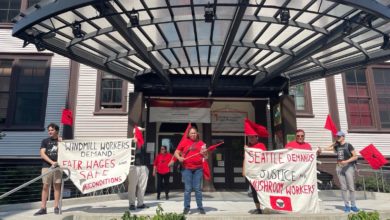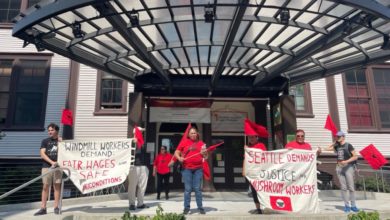As Seattle and King County, Washington face a rapidly escalating crisis of homelessness, and a progressive Seattle City Council is considering a bill to tax the wealthiest corporations to fund “deeply affordable housing,” Amazon is attempting to bully the city by stopping work on a large construction project that is supposed to provide additional office space for 4,500 employees. As a result, City Council has delayed the vote–originally scheduled for May 14–to May 21.
Amazon is already Seattle’s single largest employer with an estimated 45,000 tech workers commuting into the South Lake Union neighborhood every day. Locals have dubbed the neighborhood “Amazonia.”
Homelessness crisis caused by rapidly increasing rents
In November 2015 the City of Seattle declared a state of emergency with respect to the crisis of homelessness in Seattle. Since then the crisis has only deepened. Research conducted by Zillow shows that for each 10 percent increase in rents, an additional 523 people in Seattle will be driven into homelessness. Between 2012 and 2017 the average cost of renting a home increased by $800. The average rent for a one-bedroom apartment in Seattle is $1500/month. This adds up to $18,000/year. The general rule of thumb is that a single person should have a salary four times the cost of housing. By that metric, any household taking home less than $72,000/year ($34/hour after taxes) is going to struggle to make ends meet living in Seattle. Any financial disaster, such as loss of employment or an unexpected or uninsured health emergency, could well place even the most frugal and industrious person into a homeless encampment or living out of their motor vehicle.
The proposed “Head Tax” would be an effort to raise $75 million. “Three-quarters of the estimated $75 million that the tax raises would go to building almost 1,800 affordable housing units in the city, with the rest funding services for the homeless.” (New York Times) The proposed tax would only get, at best, 5,400 people into housing. In 2017, the homeless population in the Seattle/King County region, at roughly 11,000, was estimated to be the third largest in the United States, behind New York and Los Angeles.
The head tax proposal is limited to the City of Seattle. Its aim is to help alleviate the crisis of homelessness in Seattle. The precise tax as proposed would be for a 26.042 cent per employee hour tax which would come out to about $541 per full-time employee per year. Amazon would end up paying about $24 million into the homelessness abatement fund. The sponsors of the proposal have stated their intent to exempt “smaller employers,” meaning those grossing less than $10 or $8 million in revenue would be exempt.
Head tax=chump change for Amazon
Why is Amazon so unwilling to pay what for the company is such a paltry sum towards alleviating the emergency of homelessness in Seattle? They certainly can afford it!
In 2017 Amazon reported $5.6 billion in profit. Yet, Amazon paid no taxes in 2017. Instead they received a $137 million rebate. (Politifact)
Amazon’s $24 million share of the proposed “Head Tax” comes out to .43 percent of Amazon’s net profit for 2017. Yet the tech giant is trying to bully the city into withdrawing or defeating the head tax proposal. Why? Activist organization Seattle Transit Riders Union says this “means Amazon is scared. Not about the $20 million or more per year they might end up having to pay, because that’s all pennies to them. They’re afraid of the precedent. They’re afraid that if we win this here in Seattle, it will show people around the world that they can and should demand more from the mega-corporations that shape our lives and whose impact is too often irresponsible and exploitative.”
Shouting down Kshama Sawant
On May 3 Council member Kshama Sawant held a press conference and rally to denounce as “extortionary” Amazon’s decision to halt construction on the new office buildings until after the City Council vote on the proposed head tax. At that rally members of the Iron Workers Local 86 shouted down Sawant down every time she attempted to speak by chanting “No Head Tax.” Local 86 business manager Chris McClain said, “To reduce the jobs only increases the possibility of additional homelessness,” a reference to Amazon pausing work on the construction site where many of the iron workers are currently employed. (Seattle Times)
Jenny Durkin, the Mayor of Seattle, said “When Amazon pauses their construction of a building, it’s lots of jobs. It’s lots of sales tax that they pay on every piece of everything they buy, and our general-fund revenues are very heavily dependent on construction right now.” (Seattle Times)
In this scenario, Seattle needs those workers bringing in salaries from construction jobs and making purchases and thus paying sales taxes, so that the city can cover its costs. According to this story Amazon is providing a service to the city by building a new skyscraper because of the jobs it supplies. This puts the cart before the horse because in fact, Amazon can only make a profit due to the labor of all its employees, not only the high tech workers in downtown Seattle but also the warehouse workers in the fulfillment centers, not to forget the delivery drivers. The workers who are shouting down Sawant unfortunately have a short-sighted vision that only lets them see the immediate benefit of having a job right now as a result of this construction project. However, in the long run, Amazon and the other large corporations are perfectly willing to treat the Iron Workers as excess population the very instant that Amazon stops needing more buildings to be constructed. The union is working against its own members’ long term interests when it advocates against demanding that Amazon contribute to alleviating the homeless crisis.
The Seattle Times had a cartoon comparing the “Head Tax” to a guillotine that Kshama Sawant was using to execute local business owners. The idea that Amazon pay a fraction of a per cent of its increase in wealth to help offset the increase in homelessness is being portrayed as a cruel and vicious punishment against the “Business Community.” Why shouldn’t they contribute some amount back to the community that is providing them with the opportunity to have more wealth than most countries on the planet?
In the grand scheme of things, how necessary is the service that Amazon provides anyway? They are using that wealth to brainwash people into accepting that we must not do anything to cause them any disruption to their wealth accumulation process. That this corporation possesses such an incredible amount of wealth gives them a huge amount of power over those of us who need to sell our labor in order to survive.
Under capitalism, Amazon’s need for ever expanding profits is more important than making sure that everyone has a place to sleep indoors. If we really want to end homelessness, we need to take away Amazon’s power to suck money out of every purchase for the personal benefit of the owners and major investors. Only by eliminating the profit motive can we rationally plan what needs to be built and how to distribute the resources for the maximum benefit of all contributors.
If you want to say no to Amazon’s bullying tactics, contact Seattle City Council [email protected] and attend the March against Amazon on May 12.






